The Australian drag performers and ‘rainbow angels’ fighting back against far-right vitriol
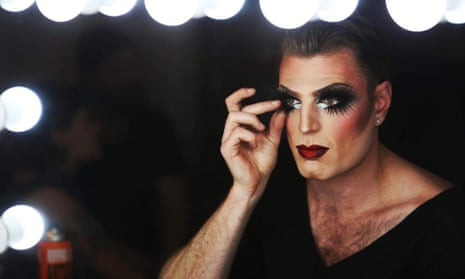
Drag performer Reuben Kaye can cover the scars of a gay bashing from his youth when he applies his makeup, but the abuse he and his queer peers cop on both the streets and social media is getting worse. Photograph: Nick Mick Pics
Cait Kelly
In 2011, Reuben Kaye sat backstage in a small theatre in the English city of Oxford, holding a tube of lipstick in his hand.
The foundation had been hard to apply over a scar near one of his eyes and the lipstick was a little heavy around the edges. But as he looked back at himself he had one thought: you look good.
When he walked through the semidarkness on to the stage that night, his cabaret show took on something more – from there, it blurred the lines with drag.
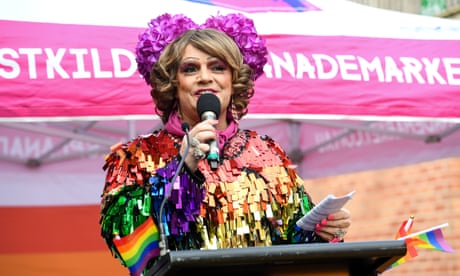
Victorian councils to hold emergency meeting on far-right targeting of drag queen storytime events
“Something just fell into place the minute I stepped on stage in heels and makeup,” Kaye says. “Through it, I found out so much about who I am, both my virtues and my foibles. In many ways, I don’t think I’d be standing here if I didn’t have this part of me.”
Kaye knows what it’s like to be on the receiving end of hate – the scar on his face came from getting gay-bashed as a teenager. But recently, he’s been at the centre of a storm.
It started with a joke – over in seconds, beamed live across the country. Kaye was on The Project in February and made a quip, filled with sexual innuendo, about Jesus getting nailed to the cross.
The audience laughed; most of the hosts roared.
But the backlash was relentless.
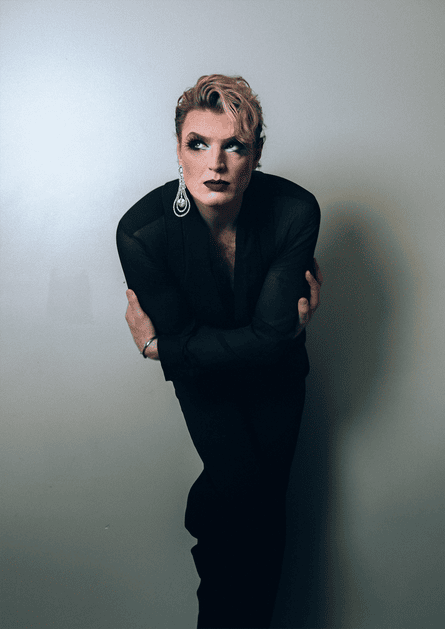
Vomit emojis and vile vitriol – it just ‘weighs you down’
Dean Arcuri spent the first half of his career having doors shut in his face.
“I look too Italian to work in Australia on TV, but then when I went to Europe, I sounded too Australian,” Arcuri says. “Every time, it was like ‘You’re really great, but you’re just not what we want.’”
Through persistence, Arcuri carved out a career in Melbourne as a cabaret singer. Although he loved the dress-up as much as the stage lights, he always shied away from drag.
He looked at other performers – often whiter, thinner, gay men whose exaggerated femininity came close to feeling real – and ruled the whole thing out. Until a conversation with a friend changed the way he saw drag – and he realised he didn’t have to lose his sideburns.
“I just kind of went, OK I’m going to try it. And I spent a good eight months coming up with the character of ‘Frock [Hudson]’ … at least six of that was coming up with the name.
“I got to have fun with it and I absolutely loved it.”
Last Wednesday morning, Arcuri’s phone wouldn’t stop buzzing. The messages – “Stay away from our kids”; “You filthy pedo” – were coming in thick and fast: in just an hour, he received 24 messages like this.
“I’ll be honest, the past 12 hours have been exhausting,” Arcuri says. “It is constant messages on social media, commenting, or just putting vomit emojis on things, sending messages to me, calling me really gross stuff. It just weighs you down.”

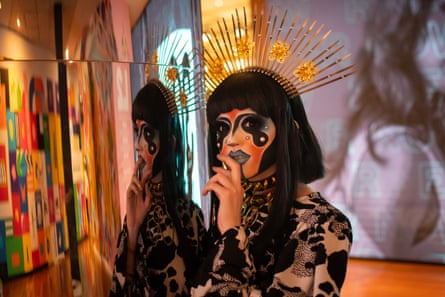
Sun 21 May 2023
THE GUARDIAN AUSTRALIA
In 2011, Reuben Kaye sat backstage in a small theatre in the English city of Oxford, holding a tube of lipstick in his hand.
The foundation had been hard to apply over a scar near one of his eyes and the lipstick was a little heavy around the edges. But as he looked back at himself he had one thought: you look good.
When he walked through the semidarkness on to the stage that night, his cabaret show took on something more – from there, it blurred the lines with drag.

Victorian councils to hold emergency meeting on far-right targeting of drag queen storytime events
“Something just fell into place the minute I stepped on stage in heels and makeup,” Kaye says. “Through it, I found out so much about who I am, both my virtues and my foibles. In many ways, I don’t think I’d be standing here if I didn’t have this part of me.”
Kaye knows what it’s like to be on the receiving end of hate – the scar on his face came from getting gay-bashed as a teenager. But recently, he’s been at the centre of a storm.
It started with a joke – over in seconds, beamed live across the country. Kaye was on The Project in February and made a quip, filled with sexual innuendo, about Jesus getting nailed to the cross.
The audience laughed; most of the hosts roared.
But the backlash was relentless.

‘Something just fell into place the minute I stepped on stage in heels and makeup,’ Reuben Kaye says. Photograph: Credit Kyahm Ross
Kaye had to wipe his personal information from the internet, including hiding his address on the electoral roll. His parents have been told not to answer any mail that comes for him. Protesters have appeared at his shows, and one gig has been postponed for three months in the hope the security threat dies down.
“It really just exploded,” Kaye says. “My phone has become an active war zone.”
Hostility isn’t new for the Melbourne-based performer, but it has increased since his appearance on The Project.
There were talks about metal detectors at gigs – about treating an arts venue as we would an American high schoolReuben Kaye
Over the past year, drag artists and other queer performers have increasingly become political targets, including from far-right groups.
In Victoria, threats have led to the cancellation of at least 11 queer events in the past six months, a dramatic shift in a country with a long history of drag in the cultural mainstream. Guardian Australia spoke to three performers this week about what it has been like to find themselves at the centre of a political storm.
Kaye still receives a barrage of abuse online and police are actively monitoring the comments on his YouTube page.
“It’s all very triggering language,” Kaye says. “It’s all the language from high school. It’s ‘Go kill yourself’. It’s ‘You’re a fucking faggot freak’ … it’s a lot.
“There were talks about metal detectors at gigs – about treating an arts venue as we would an American high school.”

Kaye had to wipe his personal information from the internet, including hiding his address on the electoral roll. His parents have been told not to answer any mail that comes for him. Protesters have appeared at his shows, and one gig has been postponed for three months in the hope the security threat dies down.
“It really just exploded,” Kaye says. “My phone has become an active war zone.”
Hostility isn’t new for the Melbourne-based performer, but it has increased since his appearance on The Project.
There were talks about metal detectors at gigs – about treating an arts venue as we would an American high schoolReuben Kaye
Over the past year, drag artists and other queer performers have increasingly become political targets, including from far-right groups.
In Victoria, threats have led to the cancellation of at least 11 queer events in the past six months, a dramatic shift in a country with a long history of drag in the cultural mainstream. Guardian Australia spoke to three performers this week about what it has been like to find themselves at the centre of a political storm.
Kaye still receives a barrage of abuse online and police are actively monitoring the comments on his YouTube page.
“It’s all very triggering language,” Kaye says. “It’s all the language from high school. It’s ‘Go kill yourself’. It’s ‘You’re a fucking faggot freak’ … it’s a lot.
“There were talks about metal detectors at gigs – about treating an arts venue as we would an American high school.”

Melbourne entertainer Dean Arcuri helped launch the Rainbow Community Angels, who help defend events targeted by far-right groups.
Photograph: Christopher Hopkins/The Guardian
Kaye says he can feel more animosity in the general community and says he is getting yelled at more when he’s out dressed in drag.
But he won’t stop – it’s not just his career, it’s about his heritage. His paternal grandfather was involved in Yiddish theatre in Poland before the family fled Europe because of the war. His father was a painter, his mother worked in film.
Australia has a long history of celebrating queer culture – in the 1960s straight and queer audiences travelled from around the country to see queer cabaret troupe Les Girls.
It launched the career of Carlotta, AKA Carol Byron, who made history in 1973 by becoming the first out trans person to play a trans character on television.
“The things that Australia is most known for are some of the campiest in the world,” says Kaye. “You’re talking the Sydney Opera House, you’re talking Priscilla Queen of the Desert, you’re talking to Barry Humphries. Even AC/DC has a song called Big Balls. And I’m sorry, but Jimmy Barnes?”
The humour is what makes Australia’s drag performers unique and it helps bridge the divide between queer art forms and mainstream straight culture.

Australia has some of the best performers – straight and gay in the world, says Kaye, “So why wouldn’t you want to celebrate that?”
Kaye says he can feel more animosity in the general community and says he is getting yelled at more when he’s out dressed in drag.
But he won’t stop – it’s not just his career, it’s about his heritage. His paternal grandfather was involved in Yiddish theatre in Poland before the family fled Europe because of the war. His father was a painter, his mother worked in film.
Australia has a long history of celebrating queer culture – in the 1960s straight and queer audiences travelled from around the country to see queer cabaret troupe Les Girls.
It launched the career of Carlotta, AKA Carol Byron, who made history in 1973 by becoming the first out trans person to play a trans character on television.
“The things that Australia is most known for are some of the campiest in the world,” says Kaye. “You’re talking the Sydney Opera House, you’re talking Priscilla Queen of the Desert, you’re talking to Barry Humphries. Even AC/DC has a song called Big Balls. And I’m sorry, but Jimmy Barnes?”
The humour is what makes Australia’s drag performers unique and it helps bridge the divide between queer art forms and mainstream straight culture.

Australia has some of the best performers – straight and gay in the world, says Kaye, “So why wouldn’t you want to celebrate that?”
Vomit emojis and vile vitriol – it just ‘weighs you down’
Dean Arcuri spent the first half of his career having doors shut in his face.
“I look too Italian to work in Australia on TV, but then when I went to Europe, I sounded too Australian,” Arcuri says. “Every time, it was like ‘You’re really great, but you’re just not what we want.’”
Through persistence, Arcuri carved out a career in Melbourne as a cabaret singer. Although he loved the dress-up as much as the stage lights, he always shied away from drag.
He looked at other performers – often whiter, thinner, gay men whose exaggerated femininity came close to feeling real – and ruled the whole thing out. Until a conversation with a friend changed the way he saw drag – and he realised he didn’t have to lose his sideburns.
“I just kind of went, OK I’m going to try it. And I spent a good eight months coming up with the character of ‘Frock [Hudson]’ … at least six of that was coming up with the name.
“I got to have fun with it and I absolutely loved it.”
Last Wednesday morning, Arcuri’s phone wouldn’t stop buzzing. The messages – “Stay away from our kids”; “You filthy pedo” – were coming in thick and fast: in just an hour, he received 24 messages like this.
“I’ll be honest, the past 12 hours have been exhausting,” Arcuri says. “It is constant messages on social media, commenting, or just putting vomit emojis on things, sending messages to me, calling me really gross stuff. It just weighs you down.”

Dean Arcuri prepares for a Storytime session as Frock Hudson.
Photograph: Christopher Hopkins/The Guardian
Arcuri had just helped launch the Rainbow Community Angels, a new group that provide volunteers, dressed as angels with large wings, to defend events targeted by far-right groups.
On Wednesday, when most local councils were celebrating International Day Against Homophobia, Biphobia and Transphobia (Idahobit), the Angels were outside Melbourne’s Eltham library making sure Arcuri’s drag storytime could still take place.
A group of 40 anti-LGBTQ+ protesters stood near Eltham library with banners saying things such as, “Kids should be protected not sex-ploited”.
Arcuri says he has built a thick enough skin to handle the hostility, but experiences a level of anxiety around performing now. He will often wait until he is inside a venue before getting changed.
“Every now and then, have people sent messages saying ‘I don’t think this is OK’? Absolutely,” he says. “But what we’re seeing now is something completely different.”
Arcuri had just helped launch the Rainbow Community Angels, a new group that provide volunteers, dressed as angels with large wings, to defend events targeted by far-right groups.
On Wednesday, when most local councils were celebrating International Day Against Homophobia, Biphobia and Transphobia (Idahobit), the Angels were outside Melbourne’s Eltham library making sure Arcuri’s drag storytime could still take place.
A group of 40 anti-LGBTQ+ protesters stood near Eltham library with banners saying things such as, “Kids should be protected not sex-ploited”.
Arcuri says he has built a thick enough skin to handle the hostility, but experiences a level of anxiety around performing now. He will often wait until he is inside a venue before getting changed.
“Every now and then, have people sent messages saying ‘I don’t think this is OK’? Absolutely,” he says. “But what we’re seeing now is something completely different.”

Belial B’Zarr: ‘[Drag] became like a very expressive art form for me, whilst at the same time bringing me closer to community.’
Photograph: Dylan Mclardy
‘It’s terrifying that there’s been such a rise in hate’
Belial B’Zarr was performing at a different youth event in Moonee Ponds in Melbourne in September when they heard their name shouted across the park.
It was Thomas Sewell, leader of the National Socialist Network, who had bought a crew of neo-Nazis to protest. One banner carried the words “Belial B’Zarr, demon flesh, drag pedos groom kids”.
“I couldn’t believe it,” says B’Zarr, who uses they/them pronouns. “Honestly, of all those bizarre things I’ve ever seen, a bunch of men in a park holding banners complaining about someone spinning around some little rainbow flags.”
B’Zarr finished their performance, while the protesters stood to the side and shouted. Since then, two events they have had scheduled have been cancelled because of security concerns.
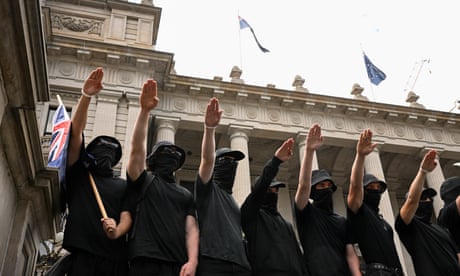
Why were neo-Nazis at an anti-trans rally in Melbourne?
B’Zarr knows far-right agitators watch what they do – and where they are performing. This makes them cautious – they open packages with their face turned away and never reveal their real name or how they look out of drag on their social media channels. They won’t even say their age – but their voice gives away the fact they are young.
They’ve always been an artist – they learn to sew before they even started school. They studied classical music and use the same laser focus needed to master the piano to create drag performances.
“There’s wig styling, makeup artistry, costume design, choreography, music, circus arts. There are so many things that you can bring to the art form,” B’Zarr said.
“It became like a very expressive art form for me, whilst at the same time bringing me closer to community.”
Felicity Marlowe, manager of Rainbow Families Victoria and co-founder of Rainbow Community Angels, says the only way to win is through visibility. She promised the angels would turn up at more events when they are needed.
“It’s terrifying that there’s been such a rise in hate,” Marlowe says. “And we really don’t want that message to continue. This is a community saying, once again, we know how to look after each other, we are here.
“We’ll be there to say that we value the art, we value the people, and we want people to live their authentic lives.”
‘It’s terrifying that there’s been such a rise in hate’
Belial B’Zarr was performing at a different youth event in Moonee Ponds in Melbourne in September when they heard their name shouted across the park.
It was Thomas Sewell, leader of the National Socialist Network, who had bought a crew of neo-Nazis to protest. One banner carried the words “Belial B’Zarr, demon flesh, drag pedos groom kids”.
“I couldn’t believe it,” says B’Zarr, who uses they/them pronouns. “Honestly, of all those bizarre things I’ve ever seen, a bunch of men in a park holding banners complaining about someone spinning around some little rainbow flags.”
B’Zarr finished their performance, while the protesters stood to the side and shouted. Since then, two events they have had scheduled have been cancelled because of security concerns.

Why were neo-Nazis at an anti-trans rally in Melbourne?
B’Zarr knows far-right agitators watch what they do – and where they are performing. This makes them cautious – they open packages with their face turned away and never reveal their real name or how they look out of drag on their social media channels. They won’t even say their age – but their voice gives away the fact they are young.
They’ve always been an artist – they learn to sew before they even started school. They studied classical music and use the same laser focus needed to master the piano to create drag performances.
“There’s wig styling, makeup artistry, costume design, choreography, music, circus arts. There are so many things that you can bring to the art form,” B’Zarr said.
“It became like a very expressive art form for me, whilst at the same time bringing me closer to community.”
Felicity Marlowe, manager of Rainbow Families Victoria and co-founder of Rainbow Community Angels, says the only way to win is through visibility. She promised the angels would turn up at more events when they are needed.
“It’s terrifying that there’s been such a rise in hate,” Marlowe says. “And we really don’t want that message to continue. This is a community saying, once again, we know how to look after each other, we are here.
“We’ll be there to say that we value the art, we value the people, and we want people to live their authentic lives.”

No comments:
Post a Comment